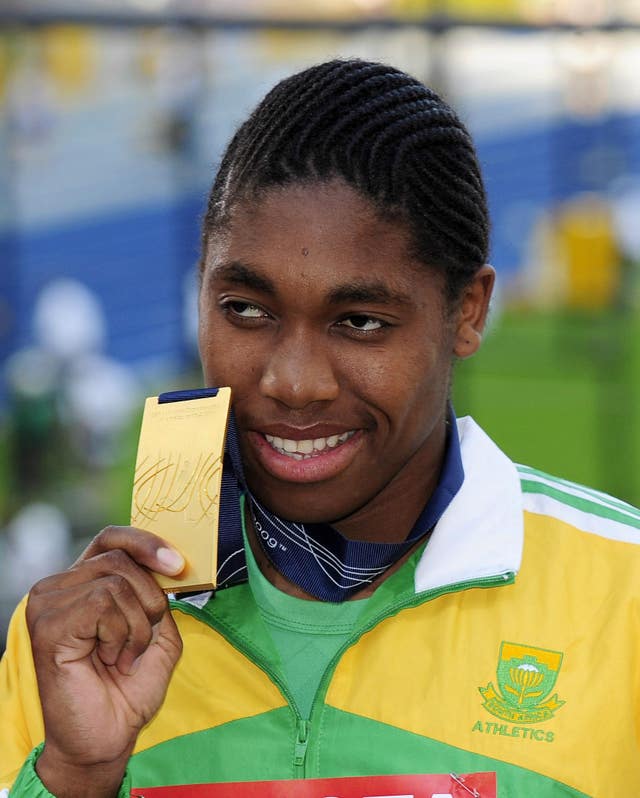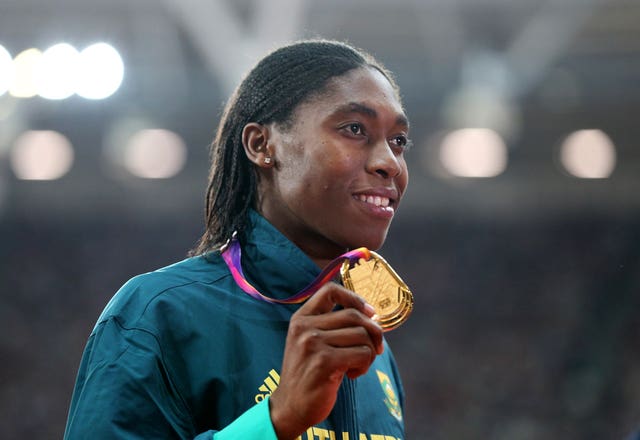
Caster Semenya’s appeal against the introduction of a testosterone limit for women with naturally-occurring high levels of the hormone by athletics’ world governing body the IAAF has been rejected by the Court of Arbitration for Sport.
The ruling, which will provoke fury among the South African star’s supporters, means she and other athletes with similar genetic conditions will have to take hormone suppressants to bring their testosterone down to a level closer to the typical female range.
“I know that the IAAF’s regulations have always targeted me specifically,” Semenya said in a statement after the ruling was announced.
“For a decade the IAAF has tried to slow me down, but this has actually made me stronger.
“The decision of the CAS will not hold me back. I will once again rise above and continue to inspire young women and athletes in South Africa and around the world.”
Indeed, the decision was far from clear cut as one of the three CAS judges agreed with Semenya, who was backed in her appeal by Athletics South Africa, and the IAAF was told there were significant caveats to the court’s approval of its ‘eligibility regulations for female classification (athletes with differences of sex development)’.
Semenya was asking sport’s highest court to declare the rules as “invalid and void with immediate effect” because they were “discriminatory, unnecessary, unreliable and disproportionate”.

But, in a statement to announce its decision, the Lausanne-based court said: “By majority, the panel has dismissed the requests for arbitration considering that the claimants were unable to establish that the DSD regulations were ‘invalid’.
“The panel found that the DSD regulations are discriminatory but the majority of the panel found that, on the basis of the evidence submitted by the parties, such discrimination is a necessary, reasonable and proportionate means of achieving the IAAF’s aim of preserving the integrity of female athletics in the restricted events.”
Those events are every race between 400 metres and a mile, including relays, as those are the only events the IAAF has so far been able to statistically demonstrate that high testosterone gives DSD, or intersex, athletes a significant advantage.
But the panel has lodged three serious reservations about the IAAF’s approach.
The first, is that it worries about “unintentional non-compliance” by athletes who struggle to keep their testosterone below the threshold of 5 nanomoles/Litre of blood serum for six months before competing.
Secondly, it said it found it “difficult to rely” on the IAAF’s evidence of significant advantage for intersex athletes in the 1500 metres and mile, as there were too few examples for it to be statistically robust.
And finally, it warned the IAAF it should review the possible side effects of the hormonal treatment it is asking these athletes to take, as this could “lead to a different conclusion as to the proportionality” of the rules.
These three points alone shine a light on just how complicated this debate has been for the IAAF and sport in general, as almost every international federation has watched this case knowing it could be the next to have to deal with these issues.

In a statement, the IAAF said it was “grateful” to CAS for its “detailed and prompt response” to Semenya’s appeal and “pleased that the regulations were found to be necessary, reasonable and proportionate”.
It added that the rules will come into effect on May 8.
In a statement issued by her legal team, Semenya said she was “pleased that a unanimous CAS panel of three arbitrators confirmed that the IAAF’s DSD regulations are in fact discriminatory against certain women” but “disappointed that two of the three arbitrators concluded that such targeted discrimination is necessary”.
It said the 28-year-old would now review the decision and consider whether to appeal, which normally involves a challenge via the Swiss federal courts – a course of action that has very rarely worked.
The IAAF has been trying to police this contentious area ever since Semenya burst onto the global scene at the 2009 World Championships in Berlin.
She won the first of her three world titles for the 800 metres in the German capital but only after she was subjected to a gender verification test and international speculation about her right to compete as a female.
Embarrassed by Semenya’s treatment, the IAAF tried to find a more scientific way to balance the rights of those born with an intersex condition with its wish to maintain a level playing field.
In 2011, it introduced ‘hyperandrogenism regulations’ which said DSD athletes must reduce their testosterone to 10 nmol/L – the male range for testosterone is 7.7 to 29.4 nmol/L and the typical female range is below 2 nmol/L.

But those rules were suspended in 2015 after Indian sprinter Dutee Chand appealed against them at CAS.
That time the court told the IAAF to go away and justify its claim that high testosterone was a key advantage for intersex athletes.
Claiming it had now that proof, the IAAF came back in 2018 with its re-branded regulations and the lower 5 nmol/L threshold that would come into effect last November.
But, as soon as it became clear that Semenya, the two-time Olympic champion, would appeal, the rules were suspended until March, six months before the start of the 2019 World Championships in Doha.
The appeal hearing took place in February but, in keeping with every other chapter in this story, CAS asked for another month to weigh up the issues raised by both sides.
It has now revealed its verdict but the wider argument is sure to continue.


Comments: Our rules
We want our comments to be a lively and valuable part of our community - a place where readers can debate and engage with the most important local issues. The ability to comment on our stories is a privilege, not a right, however, and that privilege may be withdrawn if it is abused or misused.
Please report any comments that break our rules.
Read the rules here